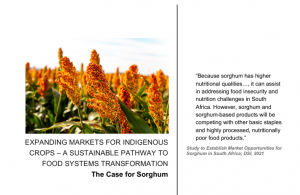Time: 10:00 - 11:30
Venue: Zoom

Join WILD Feast’s online panel discussion/dialogue, “Expanding markets for indigenous crops – A sustainable pathway to food systems transformation: The case for sorghum”, taking place on Thursday, 2 March 2023, on Zoom.
CoE-FS director, Professor Julian May, will deliver the keynote address, ‘A response to the findings and recommendations of the Study to Establish Market
Opportunities for Sorghum in South Africa, Department of Science and Innovation (DSI), 2021’.
Context
The United Nations Food Systems Summit, which took place in 2021, underscored that food systems – the way food is produced, accessed, and consumed – are broken. The Summit concluded by focusing on solutions that (i) contribute to people’s nutrition, health, and well-being; (ii) restore and protect nature; and those that (iii) adapt to local circumstances.
Key to these solutions was a recognition that we must build on good practices, such as are inherent in indigenous food systems. In its official commitment declaration to transforming its national food systems, the South African government identified promotion of indigenous systems and indigenous food products among its priority agenda objectives.
The launch of WILD Feast – a market-oriented platform for promoting Wholesome, Indigenous, Local, and Diverse (WILD) food products – is a follow-up initiative to the Summit to support the transformational food system approach. This dialogue – a feature of the WILD Feast platform – aims to facilitate ongoing discussions among public and private sector stakeholders to support increased awareness of and maximised market opportunities for indigenous systems and related food products.
Dialogue agenda
The objective of the discussions will be to address five practical questions within the context of South Africa’s food system transformation agenda. Discussions will focus on sorghum.
- What is the relevance of indigenous systems and food crops, particularly sorghum, to the food system transformation agenda?
- Is there demand at-scale?
- Is there supply at-scale?
- What are key issues faced in aligning demand and supply markets for sorghum and sorghum-based products?
- What should be done to unblock pathways to ensure sustainable demand and supply markets for sorghum (and other indigenous food crops), to contribute to South Africa’s food system objectives?
The panel discussion aims to identify three priority recommendations (to be elaborated into a position paper after the dialogue) for the Department of Agriculture, Land Reform and Rural Development (DALRRD). The position paper will contribute to DALRRD’s preparation for the Stocktaking Moment of the UN Food Systems Summit, scheduled for 24–28 July 2023. The recommendations should also be accompanied by suggested actions with which the panellists (as an individual institution or a collective) could assist to facilitate follow-up by the
department/government.
Speakers/panellists
Vuyo Lutseke – Head: Stakeholder relations, funding, and partnerships, Shared Value Africa Initiative
Dr Tshilidzi Madzivhandila – CEO: Food, Agriculture and Natural Resources Policy Analysis Network
Dr Babagana Ahmadu – Country representative: Food and Agriculture Organization
Dr Jemina Moeng – Chief director: Food Security, DALRRD
Professor Julian May – Director: DSI-NRF Centre of Excellence in Food Security (CoE-FS)
Mokgadi Itsweng – Plant-based chef and indigenous food activist
Siphiwe Sithole – CEO: African Marmalade Farm
Sipamandla Manquele – Co-founder and commercial director: Local Village Foods
Mpho Tshukudu – Registered integrative and functional nutrition dietitian
Lethu Tshabangu – Co-founder: Ukhamba Beerworx
Jeanette Sutherland – CEO/founder: AgriLuxe Marketing.
Further details
Date: Thursday, 2 March, 2023
Time: 10:00 – 11:30
Venue: Zoom (register here).
Upcoming Events
Our GOALS
We recognise that producers, processors, distributors and consumers are incorporated into the food system under varying terms and returns. We also recognise the economic, social, human and environmental health impacts associated with food security. Therefore our goal is to conduct research, build capacity and disseminate findings that will promote a sustainable food system in South Africa.
Our MISSION
Our research is concerned with the scale, nature, causes and consequences of food insecurity in South Africa and elsewhere on the African continent. Thus our mission is to investigate products, technologies, processes and policies that can reduce food insecurity and mitigate its negative outcomes. We seek to make a difference to food security by linking innovative science with critical enquiry.



